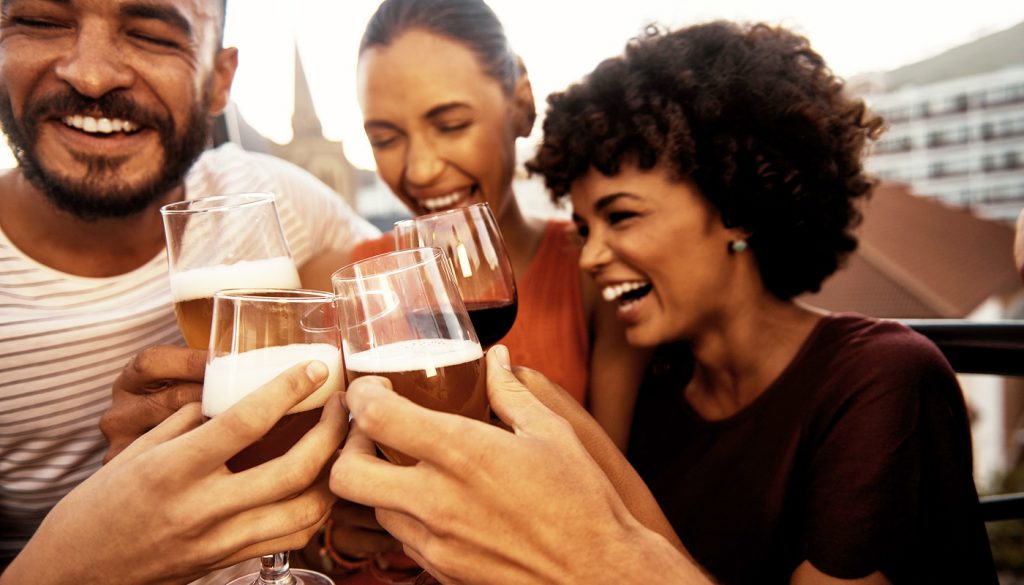Though we rarely meet, Ash is one of my best friends. I can never forget our first meeting. It was hilarious, and Ash made it so. After having two drinks, she totally blacked out and created a scene. Though everyone enjoyed the party and her cries over her recent breakup, the last moments of vomit made it a nightmare for her. She was a stranger to me, but I took her home due to her horrible condition.
The following day, I discovered it was not her first time. She had been gathering such unforgettable memories since she started drinking. As a beer lover, she couldn’t help herself not getting drunk. But as a lightweight drinker, she had to stop herself at the time.
A year passed, and we met again at a party. I saw her as an entirely transformed person. She had as many drinks as she liked without getting tipsy. I knew how, as I was her mentor in this case. Do you also want to know how? Or curious about what is a lightweight drinker? Don’t stop here. Keep reading.
Table of Contents
ToggleWhat Is a Lightweight Drinker
Someone who cannot tolerate moderate alcohol may be considered a lightweight drinker. Depending on factors including heredity, gender, body size, muscle mass, and prior drinking history, lightweight drinkers may be more susceptible to alcohol’s harmful effects.
Why Should You Avoid Being a Lightweight Drinker

Lightweight drinkers should reevaluate their drinking habits. If you’re a lightweight drinker, you will be affected by alcohol more than others. There is a risk of alcohol poisoning, dehydration, and hangovers if you do this. Accidents and second-guessing yourself are both possible results of impaired judgment.
Being a lightweight might sometimes make you feel uneasy or out of place while socializing with someone who can drink more heavily than you. That’s why it’s wise to drink intelligently and in moderation and avoid becoming a lightweight.
5 Signs that You’re a Lightweight Drinker
The symptoms might differ for all, yet 5 significant signs show you are a lightweight drinker.
1. Get Drunk Faster
Suppose you notice that alcohol affects you sooner than others. You might be a lightweight drinker. Your body metabolizes alcohol faster, producing a higher BAC with fewer drinks.
2. Experience Frequent & Severe Hangovers
You might be a lightweight drinker if you have more frequent and severe hangovers than others. Even modest alcohol use can cause headaches, nausea, exhaustion, and other side effects.
3. Lower Body Fat Percentage
Lightweight drinkers weigh less or have less body fat than typical. Since you have less water, alcohol affects you more strongly. Body weight and fat also affect alcohol storage and release.
4. Female Gender or Asian Ancestry
Women and Asians may drink lightly. This reduces the alcohol-breaking enzyme alcohol dehydrogenase (ADH) in your stomach and liver. Thus, more and longer-lasting alcohol enters your system.
5. Certain Medical Conditions
Medications or medical issues may make you a lightweight drinker. Your medication or condition impairs alcohol processing and amplifies its effects. Antidepressants, antibiotics, diabetes, liver illness, and ulcers can alter alcohol tolerance.
How to Avoid Being a Lightweight Drinker

If you find that you are a lightweight drinker, you can take steps to build up your tolerance. Here are some suggestions:
Know Your Limits & Stick to Them
Knowing your alcohol tolerance is the first step toward not becoming a lightweight drinker. Having three or fewer beers in three hours or less is considered lightweight behavior for an adult male. However, this may vary depending on the mood, health, and other circumstances. Light drinking is two drinks in two hours or less for an adult woman. These are only broad suggestions. If consuming alcohol makes you feel unwell, you should quit.
Hydrate Yourself With Plenty of Water
Dehydration is one of the most prevalent causes of hangovers, which can be avoided by drinking water before, during, and after drinking alcohol. Water, like alcohol, dilutes its concentration in the blood, reducing the impairment it causes. Drink plenty of water before each shot, and try to space out your alcoholic beverages with glasses of water. If you’re thirsty, a glass of water before bed is a good idea and can help you sleep better.
Fill Your Stomach With Nutritious Food
A healthy liver and body are both supported by a diet that is both balanced and nutritious. Consuming antioxidant-rich meals like fruits and vegetables might mitigate the oxidative stress alcohol has on your cells. The absorption of alcohol can be slowed by eating protein-rich foods such as lean meats, eggs, and dairy products. Eating high-fiber meals like whole grains, beans, and nuts can help control blood sugar and curb alcohol consumption by reducing appetite.
Limit Your Alcohol Intake
Limiting your alcohol consumption is the best defense against becoming a lightweight drinker. In moderation, one drink per day for women and up to two drinks per day for males is recommended, as stated in the Dietary Guidelines for Americans 2020-2025. 12 ounces of ordinary beer, 5 ounces of wine, or 1 & 1/2 ounces of spirits constitute one drink. Liver disease, heart disease, stroke, cancer, and accidents are some issues arising from drinking above these safe limits.
Mix it Up
Changing your alcohol consumption might also assist you in avoiding becoming a light drinker. Begin with a beer, then wine, and eventually a cocktail. This can assist you in becoming more tolerant of alcohol by preventing your body from establishing a taste for any particular type. Remembering that overeating of one type or too rapidly of another can have the opposite impact.
Conclusion
Both physical and social well-being are jeopardized by light drinking. Alcohol overindulgence can result in severe hangovers, dehydration, and impaired judgment, so knowing your limits is critical. Light drinking can be the result of heredity or health issues. Tolerance, on the other hand, may be improved with practice. Drinking enough water, eating healthily, and limiting alcohol consumption are a few examples. You can lessen the hazards linked with alcohol consumption if you follow these tips. Maintaining a healthy and happy lifestyle is as easy as drinking responsibly.

I am a passionate beer connoisseur with a deep appreciation for the art and science of brewing. With years of experience tasting and evaluating various beers, I love to share my opinions and insights with others and I am always eager to engage in lively discussions about my favorite beverage.
















